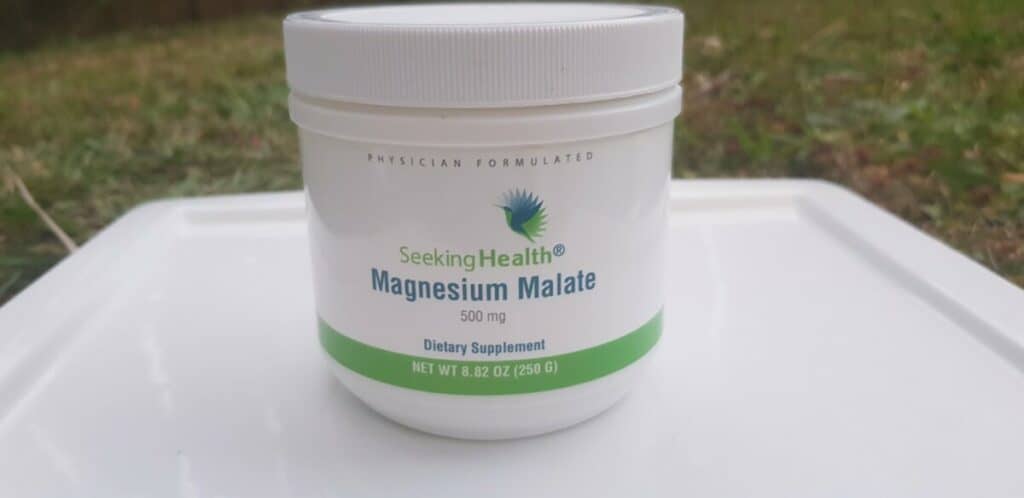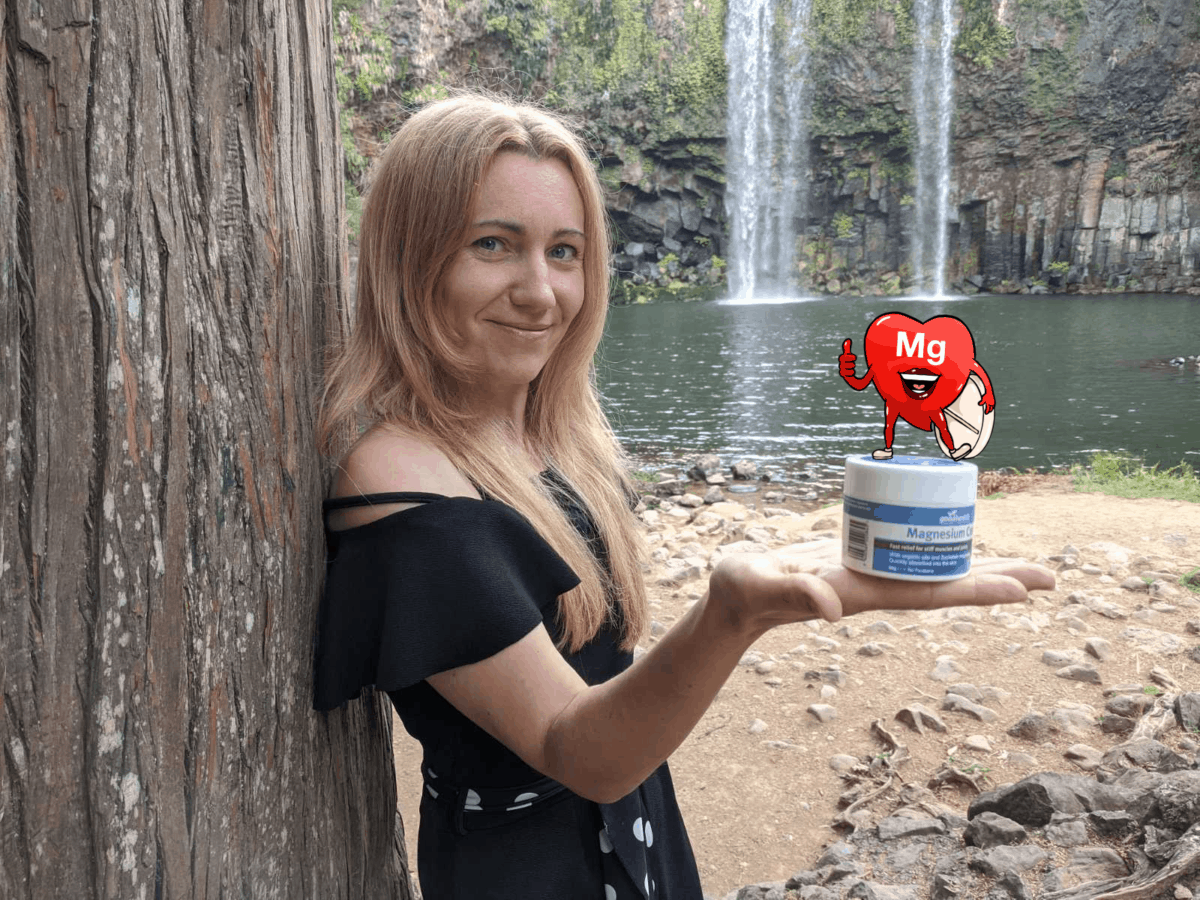When I realised that my daily diet was not enough to meet my requirement of magnesium, I decided it was time to start thinking about taking magnesium supplements.
In the last three years since I was diagnosed with SVT I have tried many forms of magnesium. I spent hours researching different brands and what makes them better than others. I’ve discovered important things to keep in mind when choosing what kind of magnesium to use for palpitations and which I want to share with you.
The two types of magnesium supplements that I avoid are magnesium oxide and magnesium citrate. The former is poorly absorbed and the latter is often linked to some minor, but annoying intestinal symptoms such as diarrhea and intestinal cramps.
Table of Contents
1. The Magnesium Supplement I Personally Use For My SVT

There are plenty of magnesium supplements available in the market. Some of the forms that I have tried more or less are marine Magnesium, Magnesium glycinate, citrate, chloride, oxide, sulfate (Epsom salt), malate, chelate and orotate.
All of these supplements will get magnesium in our system and therefore increase the level of the mineral in our body. However, all of them differ in the amount of elemental magnesium in these supplements, the rate they are absorbed, and the specific side-effects (some good, some not so good) that each of these supplements brings.
After testing more than 10 different forms of magnesium over the years, I chose Magnesium Malate (link to check the price on Seekinghealth) witch helps me with the palpitations and anxiety created by SVT, and increases my energy. An important feature for me is that malic acid also helps in the natural processes of detoxification and elimination. In my opinion, high quality and affordable price, only 0.20 cents per serving are the perfect combination. Overall I am very pleased with the effectiveness of this product.
2. Why I Picked Magnesium Malate?
The most important reason why I chose this form of magnesium is because I tried it and it did its job. Do not imagine that magnesium is the miracle supplement you take and from then on you have no problems with SVT. Not so, but it helps to some extent. It helped me about 10% in reducing ectopics. Of course in treating muscle cramps I can say that it is 90% effective. It invigorates me when I feel tired and helps me significantly in calming anxiety. The result I noticed is that it has an impact on my palpitations and improves my overall health.
I find it notable to mention that magnesium supplementation requires experimenting, and what might work for me doesn’t guarantee that it will work for you as well, no matter how similar our histories might be.
In choosing the form of magnesium, I was also interested in aspects other than testing.
- Quality. If you have searched in pharmacies you know that it is difficult to find pure magnesium supplements without other combinations of minerals or vitamins.This product from Seeking Health has no fillers, additives, or flavors. It is just elemental magnesium and malic acid. In this way the chance to have a quality product is higher because it avoids contamination during production with mercury, aluminum or other substances that are harmful to the body.
- Safety. It is GMP (Good Manufacturing Practices) verified. GMP represents the requirements imposed by the agencies that control the quality and safety of supplements.
“Magnesium Malate meets or exceeds cGMP quality standards.”
seekinghealth.com
- I know where it comes from. Magnesium malate is a compound made of magnesium and malic acid, a natural occurrent in fruit and wine, also found in the cells of our body. The elemental magnesium (pure magnesium) in this product is extracted from natural mineral deposits. The malic acid and is extracted from apples from the USA.
- Easy to control the Dosage. What I like about this product is that you can control the dosage. The daily dose of magnesium required for an adult is 350 mg, including the amount of magnesium from the diet. So if we do not consume enough magnesium in the diet, an extra 100-200 grams would be enough. Inside the container we have a scoop to measure the powder and dose it as needed. The scoop has a capacity of 2.5g or 2500 mg of which 500mg is elemental magnesium and 2000 malic acid. I prefer to buy magnesium powder because capsules and pills have different weights that do not always match the amount of magnesium I want to take.
- Hight Absorption. A lot of research finds that magnesium malate has one of the highest rates of absorption, which is equally important with the amount of elemental magnesium found in the compound.
- Elemental magnesium content. When it comes to the amount of magnesium in supplements, commonly it revolves around 33 mg of elemental magnesium per 500 mg of Mg malate compound. Seeking Health Magnesium Malate powder contains 100 mg of elemental magnesium per 500 mg of Mg malate compound. This is explained by the fact that it is a dimagnesium malate form when two atoms of the elemental magnesium attach to an atom of malic acid resulting in a larger amount of pure magnesium per compound.
- Enhance detoxification. Mg Malate is supposed to be an effective binder of aluminum, meaning it can wash out this toxic metal from your body.
What I don’t like about Magnesium Malate
Taste and texture of Magnesium malate powder
They say that if you add water and mix for 30 seconds, the powder dissolves without leaving any particles. It’s not like that. It has a slightly grainy texture. The more you mix, the finer it is and the better it is to use it in smooties or to mix it with something other than water that will take away from the taste that is not very pleasant.
Balancing the pros and cons, I thought it is worth the effort to endure the unpleasant taste and texture. The quality of this product is clearly superior to other magnesium supplements.
How Do I Take Magnesium?

I don’t have a daily routine when it comes to the time I take magnesium. I take it when I need it. Sometimes I add 100mg in my homemade carob drink the evening before bed if I feel more agitated, other times in the morning if I do not have enough energy. What I am trying to do is to establish a daily dose of at least 200 mg to cover my dietary deficit.
3. Other Types Of Magnesium Supplements To Consider

- Magnesium Sulphate or Epsom Salt – I admit that a “magnesium bath”, as bathing with Epsom salt can sometimes be called, does prove to be an extremely pleasurable experience, relieving stress and soothing achy muscles. Many people believe magnesium is being absorbed and recovered through skin. Science tells a different story. I wrote an article about Epsom salt baths and why I am still in favor of them.
- Magnesium Chloride – Magnesium Chloride has been dubbed as the master magnesium compound due to its high bioavailability. It is an unstable complex of single magnesium and two chloride ions. Chloride can also prove to be extremely beneficial for people suffering from low gastric acid (happens to all of us as we age) and increase the absorption of other minerals, besides magnesium. I also opt to use it topically, as oils and skin creams.
- Magnesium Chloride Cream – What I like about this product is that it reduces joint, muscle pain and local inflammation quickly. It is very handy to use.
- Elemental Magnesium from marine source – It is a natural source of Magnesium and has a great bioavailability.
4. About Magnesium
Magnesium is an essential mineral in the body. It can be found in various types of food and is available as a supplement as well. It is an important factor in more than 300 enzymatic reactions, some of which are crucial in the regulation of blood sugar, blood pressure, and lipid peroxidation.
Consequently, it is of immense importance for the cardiovascular system. A deficit of magnesium has been linked to cardiovascular problems such as hypertension, cardiomyopathy, congestive heart failure, various arrhythmias, and especially supraventricular arrhythmias.
However, it is not easy to diagnose hypomagnesemia. Over half of magnesium is stored in bones. About 40% is locked inside the cells (this magnesium is of interest to us) and just about 1% is found in blood serum.
It comes as no wonder that a lot of people whose blood tests show normal magnesium are actually deficient. Actually, a recent study showed that 42% of hospitalized patients are magnesium deficient. This and other studies testify that contemporary person’s diet does not yield enough of this precious mineral.
We need Magnesium because it is involved in more than 300 different biochemical reactions in our body. Some of the important functions of Magnesium are:
- It provides us with energy.
- It helps muscles and nerves work properly.
- Magnesium makes our bones stronger.
- It is involved in the formation of DNA and RNA which are the genetic
- materials of our bodies.
- It regulates our blood pressure.
- It is the component of proteins and proteins that form the bulk of our
- muscles.
- It maintains our blood glucose.
- Magnesium keeps the heart rhythm steady.
Keeping in view the above uses of magnesium, we can understand the role magnesium plays in different organs. Consequently, Magnesium plays an important role in the prevention of many diseases. Our body can run short of Magnesium due to many causes. Some of these causes are:
- Diarrhoea
- Deep burns affecting a large area of the body
- Diarrhoea
- Uncontrolled Diabetes Mellitus causing excessive urination
- Some kidney diseases
- Diseases of the gastrointestinal system including celiac disease and inflammatory bowel diseases
- Side effects of some drugs and medications
- Loss in the form of swearing
How Much Mg Do We Need?
It depends upon gender and age.
➔ Men in the age of 19 to 30 years: 400mg
➔ Men in the age of 31 and over: 420mg
➔ Women in the age of 19 to 30 years: 310 mg
➔ Women in the age of 31 and over: 320 mg
➔ Pregnant women: 350 milligrams
Magnesium plays a central role in maintaining a healthy heart rhythm as it’s involved in transporting important electrolytes, such as calcium and potassium, into cells. These electrolytes are involved in the transmission of nerve signals and the muscle contractions of a normal heartbeat. Research shows that deficiency of magnesium can cause irregular heartbeats known as arrhythmias.
Lastly, I would like you to bear in mind that even though magnesium supplementation is generally considered to be safe, you might experience some side effects. The most common ones are minor like diarrhea or stomach cramps. However, although rare, magnesium poisoning can happen, especially if you have impaired kidney function or consume doses of over 5000mg of elemental magnesium.
To end on a more happy note, I hope you found this article helpful and that you and your heart will benefit from it.


You have covered all important aspects. thanks!
Heard that sun warrior magnesium droplets are also effective. Any inputs on these?
Hi Rahul, I have never tried this product. What I know so far is that it’s a clean, natural supplement. I believe it’s effective because it absorbs faster than a pill. When I give it a try, I’ll come back with more input. Stay well!